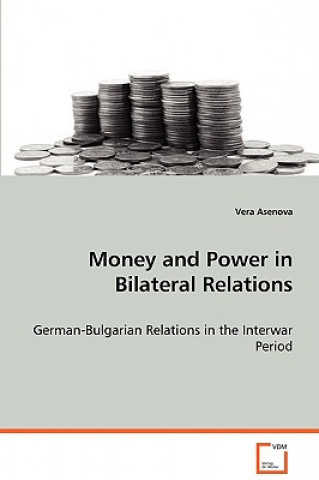
Kód: 06813074
Money and Power in Bilateral Relations
Autor Vera Asenova
As a response to the Great Depression in 1931 Germany adopted a policy of exchange control where the movement of foreign currency was subject to government control. This regime served as a defense measure against currency devaluat ... celý popis
- Jazyk:
 Angličtina
Angličtina - Vazba: Brožovaná
- Počet stran: 56
Nakladatelství: VDM Verlag Dr. Mueller E.K., 2008
- Více informací o knize

Mohlo by se vám také líbit
-

Understanding ERISA
522 Kč -

Confessions de Tullia
652 Kč -

School Of Life (1905)
565 Kč -

Possibilities and predictabilities by atosiban
1506 Kč -

In Their Own Voices
1806 Kč -

India Orissa
2402 Kč -

Foreign Affairs
498 Kč -

Remember Your Rubbers!: Collectible Condom Containers
690 Kč -

Menstrual Cycle
4882 Kč -

Stephen Ward
396 Kč -

Atchafalaya River Basin
945 Kč -

Watching
206 Kč -

New Day
574 Kč -

La Connaissance Scientifique Et Son Processus Selon Gaston Bachelard
1238 Kč
Darujte tuto knihu ještě dnes
- Objednejte knihu a zvolte Zaslat jako dárek.
- Obratem obdržíte darovací poukaz na knihu, který můžete ihned předat obdarovanému.
- Knihu zašleme na adresu obdarovaného, o nic se nestaráte.
Více informací o knize Money and Power in Bilateral Relations
Nákupem získáte 151 bodů
 Anotace knihy
Anotace knihy
As a response to the Great Depression in 1931 Germany adopted a policy of exchange control where the movement of foreign currency was subject to government control. This regime served as a defense measure against currency devaluation but it inhibbited international payments among exchange control countries.Trade between them was organized on the basis of bilateral clearing agreements, which centralized both foreign trade and payments at the state level. The book analyzes the clearing system in the case of Germany's relations with Bulgaria, which developed the highest trade dependence on Germany in the 1930s. An almost complete opposition of free trade, bilateral clearing is seen as a mechanism of political power maximization and resource allocation from the periphery to its core. Using Jonathan Kirshner's framework of monetary power the work offers a detailed analysis of the link between international monetary relations and political power. The shift of international trade regime from a Gold Standard and free trade to exchange control and bilateral clearing provided an opportunity for the German government to covertly finance its expenditure in the 1930's and during WWII. As a response to the Great Depression in 1931 Germanyadopted a policy of exchange control where themovement of foreign currency was subject togovernment control. This regime served as a defensemeasure against currency devaluation but itinhibbited international payments among exchangecontrol countries.Trade between them was organized onthe basis of bilateral clearing agreements, whichcentralized both foreign trade and payments at thestate level.The book analyzes the clearing system in the case ofGermany's relations with Bulgaria, which developedthe highest trade dependence on Germany in the 1930s.An almost complete opposition of free trade,bilateral clearing is seen as a mechanism ofpolitical power maximization and resource allocationfrom the periphery to its core. Using JonathanKirshner's framework of monetary power the workoffers a detailed analysis of the link betweeninternational monetary relations and political power.The shift of international trade regime from a GoldStandard and free trade to exchange control andbilateral clearing provided an opportunity for theGerman government to covertly finance its expenditurein the 1930's and during WWII.
 Parametry knihy
Parametry knihy
Zařazení knihy Knihy v angličtině Society & social sciences Politics & government International relations
1506 Kč
- Plný název: Money and Power in Bilateral Relations
- Podnázev: German-Bulgarian Relations in the Interwar Period
- Autor: Vera Asenova
- Jazyk:
 Angličtina
Angličtina - Vazba: Brožovaná
- Počet stran: 56
- EAN: 9783639033892
- ISBN: 3639033892
- ID: 06813074
- Nakladatelství: VDM Verlag Dr. Mueller E.K.
- Hmotnost: 86 g
- Rozměry: 229 × 152 × 3 mm
- Datum vydání: 07. August 2008
Oblíbené z jiného soudku
-

On Palestine
286 Kč -

Prisoners of Geography
276 Kč -

World Order
316 Kč -

International Relations, Global Edition
2702 Kč -

Grand Chessboard
561 Kč -

Diplomacy
464 Kč -

Clash of Civilizations and the Remaking of World Order
392 Kč -

Hundred-Year Marathon
392 Kč -

The Spy and the Traitor
306 Kč -

Understanding the Intelligence Cycle
1852 Kč -

Who Rules the World?
316 Kč -

Who Rules the World?
286 Kč -

Dead Aid
432 Kč -

World Order
358 Kč -

Adults In The Room
357 Kč -

Legacy of Ashes
451 Kč -

Evolution of Cooperation
471 Kč -

Strategic Vision
377 Kč -

Secret World
514 Kč -

Geopolitics and Geoculture
547 Kč -

Dawn of Eurasia
303 Kč -

How Spies Think
306 Kč -

Gaza in Crisis
303 Kč -

Planetary Cycles Mundane Astrology
617 Kč -

OVERTHROW : AMERICA'S CENTURY OF REGIME
627 Kč -

Is the EU Doomed?
616 Kč -

Directorate S
431 Kč -

Righteous Victims
560 Kč -

Europe's Border Crisis
1121 Kč -

America's Strategy in World Politics
1763 Kč -

Destroying Libya and World Order
481 Kč -

My Nationalist Pony
871 Kč -

Critical Practices in International Theory
5172 Kč -

American Century and Beyond
474 Kč -

Heroic Failure
286 Kč -

Oxford Handbook of the European Union
1429 Kč -

Rise and Kill First
462 Kč -

PEACE TO END ALL PEACE
488 Kč -

Tragedy of Great Power Politics
465 Kč -

Countdown to Zero Day
388 Kč -

Revenge of Geography
418 Kč -

Political Order and Political Decay
420 Kč -

Naked Diplomat
357 Kč -

Against Our Better Judgment
311 Kč -

After the Empire
360 Kč -

Legacy of Ashes
517 Kč -

Dragons and the Snakes
794 Kč -

Oxford IB Diploma Programme: Global Politics Course Book
1488 Kč -

Emergency Sex (And Other Desperate Measures)
407 Kč
Osobní odběr Praha, Brno a 12903 dalších
Copyright ©2008-24 nejlevnejsi-knihy.cz Všechna práva vyhrazenaSoukromíCookies



 Vrácení do měsíce
Vrácení do měsíce 571 999 099 (8-15.30h)
571 999 099 (8-15.30h)